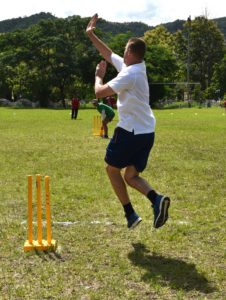
12 Sep The Reinvention of Alan Mullally
At his peak, as one of the fastest and most accurate bowlers in the world, Alan Mullally was a demon with a cricket ball.
Born in Southend, England, but moving to Australia at 4 years of age, Alan left home at the age of 17 with $100 in his pocket and a one way ticket to England to chase his dream of being a professional Cricketer. Asked by his Father when he might return, Alan said “when I make it”. And make it he did. With 230 First Class games and 708 wickets, Alan represented England in Test and ODI games to become of the best bowlers in the world… although as he’d admit himself, perhaps not one of the best batsmen.
He was recently voted into the Best England One Day International team of all time.
As Alan’s career came to an end, he did some stints at coaching and commentating, but it never quite filled the gap that cricket played in his life. He moved back to Australia, and as Alan says “I made a few bad choices, trusted some of the wrong people, my beloved father passed away, and I suffered from sever depression” making it hard to get out of bed and get to the gym some days. When things got to be too much for Alan, like many people, he turned to alcohol to mask the pain and to help him sleep. He admits he “made some bad choices” and his DUI’s in Australia have been well documented.
But like Alan’s mantra of “Hard work, Dedication, Fitness and Nutrition” that he took into each off-season to improve his speed, accuracy and stamina, Alan sought to reinvent himself once again. He started working with children to promote the game of cricket, played in charity events and even gave away some of his prized personal cricketing mementos to help raise money for underprivileged kids.
Alan was back doing what he loved.
It was while playing in a charity cricket event in Koh Chang, Thailand that Alan offered to come to Chiang Mai and work with the community projects of Lanna Rehab, working with underprivileged kids, local schools and Hill Tribes to promote the game of cricket. He offered to do this for no charge, such is the generosity and giving attitude of the man.
It was while staying at Lanna Rehab that he saw what a “rehab” really was, and after spending time with the staff he began to understand what mental health was and how it had affected him in the past, he decided that he really needed to deal with some of the unresolved issues of the past before they manifested in negative ways again in the future. He checked himself into Lanna Rehab for an open-ended stay – giving himself as long as he needed to face his own demons.
As part of Alan’s recovery plan he will continue to work with kids to teach and promote cricket, while he also focuses on his own issues. His future goal is to continue coaching and commentating and working with kids along with promoting the game that gave him so much. He also plans to speak about mental health, and offer advice to other sportsmen that may be suffering in silence.
Alan wants to share his story, because of what he has seen over the years. When their careers end, many Elite Athletes suffer with a lack of identity, too much spare time, boredom, anxiety and depression. They often turn to alcohol to “cope”. Alan is the first to acknowledge that he could have made better choices, but he feels like he has found the place to help him get his head straight and reinvent himself. He is back in the gym, back on the field, and soon, back to his best. And he has a message to all his former Elite Athlete mates – join him. There’s nothing like being in peak condition – physically and mentally.
For more information, contact us: [email protected]








